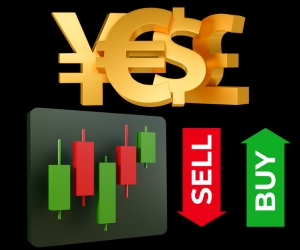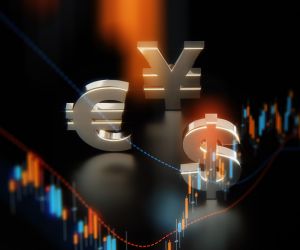HOW TO TRADE THE CHINESE RENMINBI IN THE FOREX MARKET
China, the economic powerhouse of Asia, has a significant impact on global trade. Explore the fundamentals and strategies for trading yuans in the forex market, taking advantage of China's economic strength. The CNH presents distinctive trading opportunities in a managed float system.

How to Trade the Chinese Yuan in Forex
The offshore Chinese yuan (CNH) is a unique and increasingly relevant asset in the Forex market, used in international transactions without the exchange restrictions of the onshore yuan (CNY). It attracts investors and traders interested in emerging currencies linked to the Chinese economy, the second largest in the world. "Trading" with CNH ranges from taking positions in currency pairs with the expectation that their relative value will rise or fall over time, to using financial instruments to capitalize on short-term fluctuations. Below, we examine the various alternatives for investing and trading CNH, the available markets (Forex platforms), the general steps for starting to trade, long-term investment approaches versus active trading strategies, and the key considerations for proper execution and monitoring of operations. We will focus on the practical aspects of how to trade CNH in Forex in an informed and secure manner.
Investment and Trading Alternatives with CNH in Forex
There are various ways to gain exposure to the value of the offshore Chinese yuan (CNH) in the Forex market, each with its own characteristics and considerations:
Direct buying or selling in currency pairs and holding long-term: The most basic way to trade CNH is to take positions in currency pairs that include the offshore yuan, like USD/CNH (US dollar versus offshore Chinese yuan), through a Forex broker. This involves speculating on whether the CNH will strengthen or weaken against the other currency in the pair, and holding the position long-term. Long-term investors typically base their decisions on economic fundamentals of China (such as GDP growth, People's Bank of China - PBoC policies, international trade, and relations with the US) and anticipate that the relative value of the CNH will increase or decrease according to economic trends and government decisions, accepting market fluctuations influenced by state intervention.
Active CNH trading: This involves opening and closing positions in CNH pairs more frequently to take advantage of short- or medium-term price swings. Unlike the long-term investor, the active trader seeks quick profits by speculating on daily or weekly movements of the CNH. This can include practices like day trading, where positions are opened and closed the same day to avoid overnight risks, or swing trading, holding positions for days or weeks to capture intermediate trends. Active trading requires time dedicated to market analysis (typically technical analysis of charts, identifying patterns, supports and resistances, use of indicators such as moving averages, RSI, etc.) and rigorous risk management given the volatility of the CNH, influenced by Chinese news and policies.
Forex derivatives (futures, options, CFDs): Another alternative is to trade financial derivatives whose value is based on CNH currency pairs, without needing to own the currencies directly. For example, Contracts for Difference (CFDs) allow speculation on the USD/CNH price without exchanging the physical currencies. With derivatives, you can profit in both rising and falling markets: open long positions (betting that the CNH will rise against the other currency) or short (profiting if the CNH falls). Additionally, they often offer leverage, allowing you to trade on margin to multiply your position, increasing the potential for profit but also the risk of losses. Forex futures and options with CNH are available on platforms like CME Group or through brokers, although access may be more limited than with major currencies like JPY. It is crucial to understand how they work before using them.
Indirect financial instruments (ETFs and related stocks): For those who prefer not to trade directly in Forex, there are products that offer indirect exposure to the CNH. An example is currency ETFs, such as those that replicate the performance of the CNH against the USD (e.g. WisdomTree Chinese Yuan Strategy Fund - CYB), traded on traditional exchanges. Alternatively, some investors might opt for stocks of Chinese companies listed in offshore markets, whose performance may correlate with the strength of the CNH, although it also depends on company-specific factors. These instruments allow you to benefit from the trends of the CNH without directly managing currency pairs.
Markets Where CNH is Traded: Forex Platforms
The buying and selling of currency pairs with CNH occur in the Forex market, accessible primarily through brokers and specialized platforms:
Centralized Forex brokers: These are platforms operated by companies that act as intermediaries between traders and the interbank market, where currencies are traded globally. At a Forex broker, users deposit funds into an account and trade pairs such as USD/CNH through a trading platform (like MetaTrader 4/5 or TradingView). Popular examples include IG, OANDA, and Saxo Bank. These brokers offer increasing liquidity for the CNH, especially in USD/CNH, allowing trades to be executed at the desired price, although with wider spreads than major currencies like JPY. They also provide advanced tools (limit orders, stop-loss, leverage, real-time charts) and customer support, making them the most common route for retail traders. In return, the user entrusts their funds to the broker and must meet requirements like identity verification.
Institutional and OTC markets: At the institutional level, Forex operates as a decentralized market (over-the-counter), where banks, funds, and large participants trade currencies directly or through platforms like EBS or Reuters. For the CNH, much of the volume occurs in offshore markets, influenced by the PBoC and Chinese banks managing its value within acceptable limits. For retail traders, access to this liquidity is indirect, through brokers that connect with the interbank market. Some brokers offer ECN execution, but the liquidity of the CNH is lower than that of major currencies, which may imply greater volatility and costs.
Besides brokers, CNH is traded in derivatives markets such as futures and options through regulated exchanges (e.g., CME Group), and through banks or OTC platforms, especially in financial centers like Singapore. For most retail traders, Forex brokers will be the main avenue to trade CNH. The Forex market operates globally 24/5 (Monday to Friday), with CNH showing more activity during the Asian session due to China's time zone and economic influence.
General Steps to Trade CNH in Forex
Trading the offshore Chinese yuan (CNH) effectively requires following a series of carefully planned steps. Below are the general steps, from preparation and research to trade execution and subsequent monitoring, integrating risk management at every stage:
Research and understand the asset: Before trading CNH, it is essential to educate yourself on what affects its value. Research the factors that move the offshore yuan price, like the People's Bank of China (PBoC) policies, which set a daily band for the CNY that influences the CNH, international trade (Chinese exports and imports), relations with the US (trade tensions or tariffs), and offshore capital flows. For example, a relaxation of controls or strong economic growth tends to strengthen the CNH, while restrictions or weak data may weaken it. Economic news, PBoC interventions, or geopolitical events also significantly influence it. Understanding these fundamentals and the dynamics of Forex will prepare you to make informed decisions.
Define your style and strategy: Determine if your focus will be long-term investing or active trading, or a combination. This involves establishing a plan according to your objectives and risk tolerance. For instance, do you plan to do day trading with USD/CNH or hold a long-term position based on the internationalization of the yuan? If you opt for active trading, decide which strategies you will follow (trend, swings, news trading) and whether you will use technical, fundamental analysis, or both. If your focus is long-term, define entry and exit criteria based on macroeconomic events or Chinese policies. A clear plan will help you avoid impulsive decisions.
Choose the right platform or broker: Select a reliable Forex broker that offers pairs with CNH (like USD/CNH). Compare options in terms of security (regulated by entities like FCA), commissions (spreads, swaps), available leverage, and platform usability. Open an account in advance, complete necessary verifications, and deposit funds. Set up security measures (strong passwords, 2FA). If planning to trade derivatives (futures or options), choose a regulated broker or exchange that offers them and understand their terms before investing.
Analyze the market and decide your position: Before executing a trade, analyze current market conditions according to your plan. For active traders, study the pair's chart (e.g., USD/CNH) to identify trends, supports, and resistances; for long-term investors, evaluate whether economic conditions favor the CNH (e.g., strength of Chinese trade). Decide whether you will take a long position (buy CNH against another currency, expecting it to rise) or short (sell CNH, expecting it to fall). Determine the position size (lots) according to your capital and risk management, considering the potential volatility of the CNH.
Execute the order and set protections: Place the buy or sell order in the chosen pair (e.g., sell USD/CNH if you expect CNH to strengthen). Use market orders (immediate execution) or limit orders (execution at a specific price). Set a stop-loss to limit losses if the market moves against you and a take-profit to secure gains when reaching your target. For example, if trading USD/CNH at 7.20, you might set a stop-loss at 7.25 and a take-profit at 7.15. These orders manage risk and reduce the need for constant monitoring, crucial for a currency influenced by interventions.
Monitoring and tracking the position: Once the position is open, follow its progress. Watch the pair's price against your entry and exit points, and stay updated on economic news (e.g., PBoC data or trade tensions) that may alter the trend. Active traders adjust their stops to secure gains or close positions if conditions change; long-term investors review less frequently but must stay alert to key fundamentals. Use price alerts or mobile platforms to facilitate monitoring.
Close or adjust the position: Close the position according to your plan to secure profits (by selling or repurchasing the pair) or accept predetermined losses if the market goes against you. Consider partial closings if gains are significant. Cut losses soon and let profits run, avoiding emotional decisions. Analyze the result after closing: was the plan fulfilled? What was learned? Recording your trades will refine your strategy over time.
Long-term Investment (Holding) vs. Active Trading Approaches
The approach to trading CNH in Forex may differ based on the operator's time horizon and philosophy. We can distinguish between the long-term investment approach and short-term active trading strategies:
Long-term investment (holding): Those who trade CNH long-term take positions in pairs like USD/CNH and hold them, trusting that the offshore yuan will strengthen with the internationalization of the renminbi or weaken due to economic restrictions. This approach relies on China's economic growth, PBoC policies to promote CNH in global trade, and relations with key trading partners like the US. It requires tolerating moderate fluctuations, influenced by interventions, viewing declines or increases as opportunities to adjust positions. Long-term investors anticipate that CNH will reflect future Chinese economic trends, setting price targets to take profits or rebalance exposure. Never invest more than you are willing to lose, as Forex is volatile and CNH is subject to government controls.
Active trading (short/medium term): Active traders seek to capitalize on CNH volatility in short timeframes, with movements that can arise from economic data, news, or PBoC adjustments. They rely on technical analysis (charts, indicators like RSI or MACD) for entries and exits. Common strategies include:
Intraday trading: Opening and closing positions the same day to capture quick movements, avoiding overnight risks.
Swing trading: Holding positions for days or weeks to take advantage of intermediate swings, reading larger trends.
Trend trading: Following clear CNH trends, maintaining positions until signs of reversal.
Hedging strategies: Using derivatives to protect a long-term position against adverse movements.
Active trading requires dedication, emotional control, and discipline. Profits can be quick, but so can losses, especially in response to news or PBoC interventions, so it's crucial to operate with a plan and execute protective orders without hesitation.
Key Considerations in Trade Execution and Follow-Up
Whether long-term or active trading, there are fundamental principles when trading CNH in Forex:
Risk and capital management: Do not risk more than you can lose. Use only a fraction of your capital per trade (e.g., 1-2%) and set stop-loss to limit losses, essential given the possibility of sharp movements due to PBoC interventions. With leverage, be cautious, as it magnifies risks and gains. Diversify your trades not to rely solely on CNH.
Security and custody: Choose regulated brokers and protect your account with strong passwords and 2FA. In Forex, you do not hold physical currencies, but ensure your funds are with a reliable broker to avoid bankruptcy or fraud risks.
Costs and liquidity: Consider spreads, swaps, and broker commissions. Pairs with CNH (e.g., USD/CNH) have increasing liquidity but lower than major currencies like JPY, which implies wider spreads and possible slippage, especially outside the Asian session. Use limit orders to optimize prices.
Discipline and plan adherence: Define clear rules (entry, exit, size) and stick to them. Use preset orders to avoid impulses. Record your trades to learn and improve.
Continuous information and learning: Stay updated on Chinese economic data, PBoC decisions, trade tensions, and events in Asia. Filter noise and enhance your skills in technical and fundamental analysis to adapt to the market and anticipate interventions.
SWOT Analysis of CNH Trading in Forex
This SWOT analysis evaluates the trading of Offshore Yuan (CNH) in Forex, considering economic, regulatory, and political factors influencing its operation and volatility in international markets.
Strengths:
Support from a strong economy: China is the world's second-largest economy, and its commercial strength supports the value of the CNH in the international context.
Increased use in global trade: The internationalization of the yuan has been growing, driven by trade agreements and the expansion of foreign trade.
Weaknesses:
Regulatory intervention: The Chinese government maintains strict control and occasionally direct interventions that can generate volatility in the CNH.
Capital controls: Restrictions on the movement of capital limit the liquidity and conversion of the CNH in international markets.
Opportunities:
Internationalization of the yuan: The gradual liberalization and greater acceptance of the CNH in global transactions can increase its liquidity and use in Forex.
Trade alliances: Bilateral agreements and trade treaties can improve the demand and stability of the CNH in the market.
Threats:
Trade tensions: International disputes and sanctions can affect confidence in the CNH.
Uncertainty in internal policies: Abrupt changes in China's economic policy can generate unexpected movements in the value of the CNH.
What is a Forex Broker?
A Forex Broker is the entity or platform that allows you to trade in the currency market, facilitating the buying and selling of currency pairs from around the world. Unlike other financial markets, Forex focuses on currency exchange, where currencies such as the dollar, euro, and yen, among many others, are traded.
Why do we need a Forex Broker?
Trading in the Forex market is not as simple as exchanging money from one currency to another at an exchange office. It requires technical knowledge, trading strategies, and the use of advanced platforms. A Forex Broker brings all these tools together in one place, allowing you to access real-time market prices, execute trades quickly, and manage your risk, in exchange for a commission or spread. This lets you focus on your trading strategies without worrying about market infrastructure.
Examples and Comparisons:
There are several internationally recognized Forex Brokers, such as IG Markets, OANDA, FXCM, and XM, among others. Each offers trading platforms with specific features, such as advanced charts, technical analysis tools, and different types of accounts. Some stand out for providing personalized service and educational resources, while others may offer more competitive spreads or higher leverage. These details allow you to choose the broker that best suits your needs and trading style.
Regulatory and Security Aspects
It is crucial that the Forex Broker you choose is regulated by recognized financial authorities, such as the U.S. Securities and Exchange Commission (SEC) and the Commodity Futures Trading Commission (CFTC) in the United States, the Financial Conduct Authority (FCA) in the United Kingdom, or the Australian Securities and Investments Commission (ASIC) in Australia, among others. This regulation ensures that the broker complies with strict standards of security, transparency, and protection of client funds, providing you with greater confidence when investing your money.
How Do Forex Brokers “Connect” to Currency Markets?
Through the use of advanced technological platforms and agreements with liquidity providers, Forex Brokers facilitate the execution of orders in the currency market. These brokers connect your trading account with multiple liquidity sources, allowing transactions to be carried out quickly and efficiently, adjusting to the real-time market price. Additionally, they manage aspects such as leverage, margin, and order execution, charging a commission or applying a spread on each transaction.
In conclusion, a Forex Broker is your gateway to the dynamic world of the currency market, offering you the tools, security, and access needed to trade globally.









